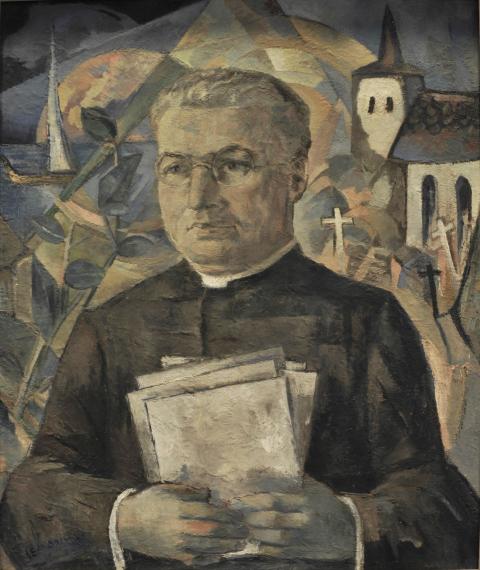Martinus Cobbenhagen
Martinus Joseph Hubertus (Martiunus) Cobbenhagen (1893- 1954) was rector magnificus of the Roomsch Katholieke Handelshoogeschool during the periods 1932–1933, 1937–1938, and 1945–1946. Because of his commitment to the management of the institution and his attention to student life and alumni*, he acquired the reputation of 'father of the Hogeschoool community'.
Because of his efforts to link economics and ethics, the importance he attaches to philosophical aspects, and his instruction manual—with philosophy as a compulsory course—he still enjoys the reputation of founding father of Tilburg University.
Cobbenhagen, born in Gulpen, is ordained as a priest after attending the minor seminary at Rolduc in 1917. In 1921, he passed his doctoral exam in economics at the Nederlandsche Handels-Hoogeschool in Rotterdam, where in 1927 he obtained his PhD with the thesis named De verantwoordelijkheid in de onderneming (Responsibility in the company). In the same year, he became full professor at the newly founded Roomsch Katholieke Handelshoogeschool in Tilburg.
During the interwar period, Cobbenhagen was one of the propagators of the Catholic socio-economic ideas, among others inspired by the papal encyclical Quadragesimo Anno from 1931.

In times of crisis, poverty, and unemployment after the New York stock exchange crash (1929), a plea was made for social justice. In this spirit, Cobbenhagen advocates solidarism as a principle of socio-economic order, instead of purely individualistic capitalism or state socialism.
Cobbenhagen has a great influence on the way the new hogeschool develops. He is an advocate of scientific training for the practice of socio-economic life. He sees economics as a 'middle science'—between the natural sciences and the humanities. In his view, quantitative and model-based methods should be used, but they should not determine the core of the science. Economic science should be organically linked to other disciplines, such as sociology and psychology. An isolated economic science, Cobbenhagen argues, will only contribute to human materialism and the mechanization of life.
In 1934, he was one of the founders of TAEK*, the first alumni association, and in 1935 he was co-founder of the Tilburg economics journal Economie, of which he remained editor until his death. This journal devoted a relatively large amount of space to issues of socio-economic order.
During the Second World War, Cobbenhagen was interned as a hostage in the neighboring town of Haaren because of the dismissive attitude of the Hogeschool towards the German occupiers. After the war, he became chair of the Committee on Property Distribution. In Tilburg, he became chair of the Wijkwerk foundation, which provided help to socially weak families. In 1947, he received the distinction of being a secret chamberlain of the Pope.
The university's oldest building is named after Cobbenhagen, as is the Tilburg Cobbenhagen Center*, which has as one of its aims to reflect on the significance of the ideas of this founding father for the contemporary academic context and society.
More about history and academic heritage
The Tilburg University academic heritage is a very diverse set of archives, visual materials, collections, devices, recorded stories, et cetera that relate to the history of the university.
